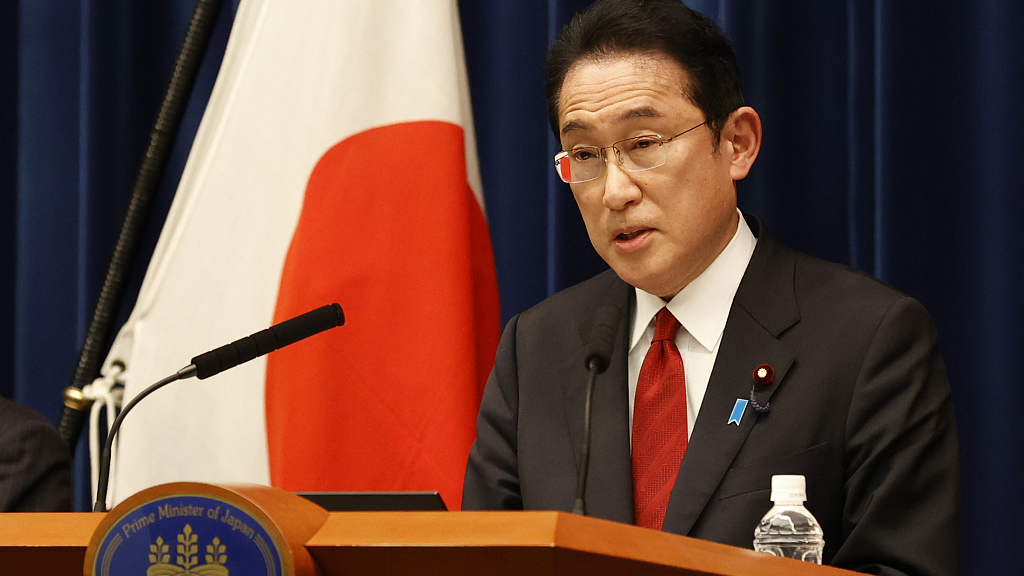
Japan's Prime Minister Fumio Kishida speaks during a press conference at the prime minister's official residence in Tokyo, April 8, 2022. /VCG
Japan's Prime Minister Fumio Kishida speaks during a press conference at the prime minister's official residence in Tokyo, April 8, 2022. /VCG
Editor's note: Hamzah Rifaat Hussain is a TV anchor at Indus News in Pakistan, a former visiting fellow at the Stimson Center in Washington and former assistant researcher at the Islamabad Policy Research Institute. The article reflects the author's opinions and not necessarily those of CGTN.
On April 9, Japan and the Philippines agreed to start talks on a defense agreement. The development came after Chinese President Xi Jinping and his Philippine counterpart Rodrigo Duterte had a telephone consultation on April 8 on maintaining peace in the South China Sea. They agreed on exercising restraint, dissipating tensions and working on a mutual framework for functional cooperation.
The importance placed on maintaining peace at the bilateral and multilateral level by the Chinese and Philippine leaders stands in stark contrast to Tokyo's relentless pursuit of defense strategies and military agreements with other states to counter Beijing.
The rationale for the new defense deal mirrors the American narrative that Russia and China are major global threats and need to be countered. But lumping China and Russia together as a joint threat is delusional. On the crisis in Ukraine, Beijing has repeatedly called for de-escalation and pursuing an all-inclusive dialogue.
While Japan says Russia's action will affect Asia's security, the truth – ignored by Tokyo – is that it is the heightened U.S. military presence in the region that is affecting the security equation. So is the AUKUS security pact between Australia, the United Kingdom and the U.S.
Fumio Kishida's administration is adamant that inking defense agreements with other states without proper contextual frameworks will be the path toward everlasting peace. It is not. Japan's entire strategy is actually a blatant disregard for diplomacy as a tool to diffuse tensions between states.
Besides the Philippines, Japan has formed "two-plus-two" frameworks with eight other countries – Germany, India, Indonesia, Russia, the U.S., U.K., France and Australia.
Additionally, in January, Japan and Australia signed a defense cooperation pact called the Reciprocal Access Agreement, involving more engagements between the Australian Defense Force and the Japanese Self-Defense Force, including joint military exercises.

A photo of the sun setting in the South China Sea, April 22, 2021. /VCG
A photo of the sun setting in the South China Sea, April 22, 2021. /VCG
These initiatives form part of Japanese Prime Minister Fumio Kishida's renewed pledge to acquire enemy strike capability to counter China, a controversial move given that it violates Tokyo's own war-renouncing constitution. This underlines a massive disconnect between principle and action.
The truth is that Tokyo's path of military adventurism will only serve to imperil regional security in the absence of dialogue. The fact that Japan has sought to go down this path of escalation also exposes its recklessness and insensitivity to peace and strategic stability.
In the long run, the security pacts and defense agreements initiated by Japan will not gain universal acceptance. The majority of countries will opt for dialogue and peace regardless of differences with China. Some of the countries that have defense pacts with Japan, such as Germany and Indonesia, also have a constructive relationship with China.
Tokyo, however, does not seem to get the message.
(If you want to contribute and have specific expertise, please contact us at opinions@cgtn.com. Follow @thouse_opinions on Twitter to discover the latest commentaries on CGTN Opinion Section.)

